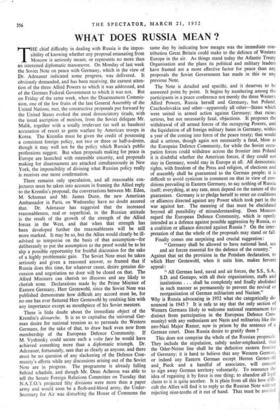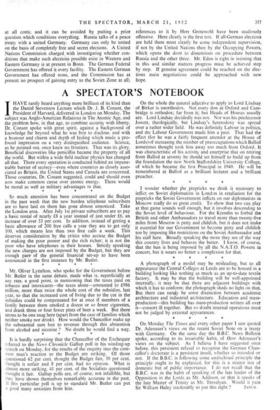WHAT DOES RUSSIA MEAN ?
THE chief difficulty in dealing with Russia is the impos- sibility of knowing whether any proposal emanating from Moscow is seriously meant, or represents no more than an interested diplomatic manoeuvre. On Monday of last week the Soviet Note on peace with Germany, which in the view of Dr. Adenauer indicated some progress, was delivered. It obviously demanded, and has been receiving, the earnest atten- tion of the three Allied Powers to which it was addressed, and of the German Federal Government to which it was not. But on Friday of the same week, when the Disarmament Commis- sion, one of the few fruits of the last General Assembly of the United Nations, met, the constructive proposals put forward by the United States evoked the usual denunciatory tirade, with the usual ascription of motives, from the Soviet delegate Mr. Malik, together with a totally irrelevant (as well as baseless) accusation of resort to germ warfare by American troops in Korea. The Kremlin must be given the credit of possessing a consistent foreign policy, not two or three or half-a-dozen, though it may well not be the policy which Russia's public professions suggest. But when proposals making for peace in Europe are launched with ostensible sincerity, and proposals making for disarmament are attacked simultaneously in New York, the impossibility of divining what Russian policy really is receives one more confirmation.
There remains only speculation, and all reasonable con- jectures must be taken into account in framing the Allied reply to the Kremlin's proposal; the conversations between Mr. Eden, M. Schuman and Mr. James Dunn, the new American Ambassador in Paris, on Wednesday have no doubt assured that. Dr. Adenauer has suggested that the increased reasonableness, real or superficial, in the Russian attitude is the result of the growth of the strength of the Allied forces in the West, and that when that strength has been developed further the reasonableness will be still more marked. It may be so, but the Allies would clearly be ill- advised to temporise on the basis of that assumption—for deliberately to put the assumption to the proof would be to let slip a possible opportunity for fruitful discussion for the sake of a highly problematic gain. The Soviet Note must be taken seriously and given a reasoned answer, so framed that if Russia does this time, for whatever cause, desire genuine dis- cussion and negotiation no door will be closed on that. The Allied Ministers can cherish no illusions and are likely to cherish none. Declarations made by the Prime Minister of Eastern Germany, Herr Grotewohl, since the Soviet Note was published demonstrate how difficult any accord must be, for no one has ever flattered Herr Grotewohl by crediting him with any importance except as mouthpiece of his Soviet mentors.
There is little doubt about the immediate object of the Kremlin's demarche. It is so to capitalise the universal Ger- man desire for national reunion as to persuade the Western Germans, for the sake of that, to draw back even now from membership of the European Defence Community. If M. Vyshinsky could secure such a volte face he would have achieved something more than a diplomatic triumph. Dr. Adenauer, fortunately, sees that as clearly as anyone, and there must be no question of any slackening of the Defence Com- munity's efforts while any discussions arising out of the Soviet Note are in progress. The programme is already falling behind schedule, and though Mr. Dean Acheson was able to tell the Senate Foreign Relations Committee on Tuesday that N.A.T.O.'s projected fifty divisions were more than a paper army and would soon be a flesh-and-blood army, the Under- Secretary for Air was disturbing the House of Commons the same day by indicating how meagre was the immediate con- tribution Great Britain could make to the defence of Western Europe in the air. As things stand today the Atlantic Treaty Organisation and the plans its political and military leaders have framed are a more effective factor for peace than any proposals the Soviet Government has made in this or any previous Note.
The Note is detailed and specific, and it deserves to be answered point by point. It begins by numbering among the participants in a peace conference not merely the three Western Allied Powers, Russia herself and Germany, but Poland, Czechoslovakia and other—apparently all other—States which were united in armed action against Germany; that raises serious, but not necessarily fatal, objections. It proposes the withdrawal of all armed forces of the occupying Powers, and the liquidation of all foreign military bases in Germany, within a year of the coming into force of the peace treaty; that would deal a serious, though again not necessarily a fatal, blow at the European Defence Community, for while the Soviet occu- pation forces could withdraw across the frontier into Poland it is doubtful whether the American forces, if they could not stay in Germany, would stay in Europe at all. All democratic rights, with freedom of the Press and religion, of elections and of assembly shall be guaranteed to the German people; it is difficult to avoid cynicism in comment on that in view of con- ditions prevailing in Eastern Germany, to say nothing of Russia itself; everything, at any rate, must depend on the nature of the guarantees. Germany is to pledge herself to enter no coalitions or alliances directed against any Power which took part in the war against her. The meaning of that must be elucidated beyond all possibility of misunderstanding. Does Moscow regard the European Defence Community, which is openly intended as a defence against possible aggression by Russia, as a coalition or alliance directed against Russia ? On the inter- pretation of that the whole of the proposals may stand or fall.
Finally comes one surprising and crucial suggestion: " Germany shall be allowed to have national land, sea and air forces essential for the defence of the country." Against that set the provision in the Potsdam declaration, to which Herr Grotewohl, when it suits him, makes fervent appeal: " All German land, naval and air forces, the S.S., S.A., S.D. and Gestapo, with all their organisations, staffs and institutions . . . shall be completely and finally abolished in such manner as permanently to prevent the revival or reorganisation of German militarism and Nazism."
Why is Russia advocating in 1952 what she categorically de- nounced in 1945 ? It is safe to say that the only section of Western Germans likely to welcome national rearmament (as distinct from participation in the European Defence Com- munity) with any enthusiasm are Nazis and militarists like the neo-Nazi Major Remer, now in prison by the sentence of a German court. Does Russia desire to gratify them ?
This does not comprise the whole of the Russian proposals.
They include the stipulation, subtly under-emphasised, that the Oder-Neisse line shall be the definitive eastern frontier of Germany; it is hard to believe that any Western German, or indeed any Eastern German except Herren Grotewohl and Pieck and a handful of associates, will consent to sign away German territory voluntarily. To renounce the idea of regaining it by force is one thing; to abandon all kcal claim to it is quite another. It is plain from all this how diffi- cult the Allies will find it to reply to the Russian Note without rejecting nine-tenths of it out of hand. That must be avoided at all costs; and it can be avoided by putting a prior question which conditions everything. Russia talks of a peace treaty with a united Germany. Germany can only be united on the basis of completely free and secret elections. A United Nations Commission charged, with investigating whether con- ditions that make such elections possible exist in Western and Eastern Germany is at present in Bonn. The German Federal Government has offered it every facility. The Eastern German Government has offered none, and the Commission has at present no prospect of gaining entry to the Soviet Zone at all; references to it by Herr Grotewohl have been studiously offensive. Here clearly is the first test. If all-German elections are held there must clearly be some independent supervision, if not by the United Nations then by the Occupying Powers, which opens the door to dissensions on procedure between Russia and the other three. Mr. Eden is right in insisting that in this and similar matters progress must be achieved step by step. If genuine agreement could be reached on the elec- tions main negotiations could be approached with new hope.



































 Previous page
Previous page